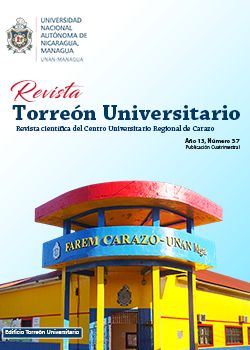Solving Working Memory Challenges in L2 English Writing for Spanish Speakers through Deep-Level Processing Strategies
DOI:
https://doi.org/10.5377/rtu.v13i37.18017Keywords:
Cognitive demands, Deep approach to skill acquisition, Foreign language, Writing, Working memoryAbstract
This research paper explores the complex interplay between working memory (WM) and writing proficiency in English as a foreign language, particularly for L2 Spanish speakers of English. It posits that these individuals encounter cognitive challenges in WM due to the inherent complexity of foreign language (L2) writing. The paper advocates for the adoption of a deep-learning approach during the early stages of English acquisition to deal with these challenges effectively. Emphasizing the importance of optimally acquiring foundational skills, such as listening, speaking, and reading, it recommends that L2 writers conscientiously cultivate these skills to enhance their writing abilities. This proactive engagement with foundational skills, together with hand note-taking strategies, is proposed as a strategic means for L2 writers to overcome the cognitive demands associated with English writing proficiency.
Downloads
References
Baddeley, A. D. (2000). El búfer episódico: ¿un nuevo componente de la memoria de trabajo?
Tendencias. Cognit. Sci. 4, 417–422. doi: 10.1016/s1364-6613(00)01538-2
Conway, M. A., & Gathercole, S. E. (1987). Modalidad y memoria a largo plazo. Revista de Memoria y Lenguaje, 26, 341–361. doi:10.1016/0749-596X(87)90118-5
Cornoldi, C., Del Prete, F., Gallani, A., Sella, F., Re, A. M., y Arfè, B. (2010). Componentes que afectan a la escritura expresiva en escritores típicos y discapacitados. Adv.
Aprender. Compórtate. Inutilizar. 23, 269–286. DOI: 10.1108/s0735-004X(2010)0000023012
De Vita, F., Schmidt, S., Tinti, C., & Re, A. M. (2021). El papel de la memoria de trabajo en los procesos de escritura. Fronteras de la Psicología, 12, 738395.
Dodson, C. S., & Schacter, D. L. (2001). "Si lo hubiera dicho lo habría recordado": Reducir los falsos recuerdos con una heurística de distinción. Psychonomic Bulletin & Review, 8, 155–161. doi:10.3758/BF03196152
Gathercole, S. E., & Conway, M. A. (1988). Explorar los efectos de la modalidad a largo plazo: La vocalización conduce a una mejor retención. Memoria y cognición, 16, 110–119. doi:10.3758/BF03213478
Gobet, F., & Wood, D. J. (1999). Modelos de experiencia de aprendizaje y tutoría por ordenador.
Informática y Educación, 33, 189–207.
Hayes, J. R., y Flower, L. S. (1980). "Identificación de la organización de los procesos de escritura en los procesos cognitivos en la escritura", en Procesos cognitivos en la escritura, eds L. W. Gregg y E. R. Steinberg (Hillsdale, NJ: Lawrence Erlbaum Associates), 3–30.
Hayes, J. R., & Chenoweth, N. A. (2006). ¿Interviene la memoria de trabajo en la transcripción y edición de textos? Comunicación Escrita, 23(2), 135-149.
Hopkins, R. H., & Edwards, R. E. (1972). Efectos de la pronunciación en la memoria de reconocimiento. Revista de Aprendizaje Verbal y Comportamiento Verbal, 11, 534–537. doi:10.1016/S0022-5371(72) 80036-7
Kellogg, R. T. (1996). Un modelo de memoria de trabajo en la escritura. En C. M. Levy y S. Ransdell (Eds.), La ciencia de la escritura: teorías, métodos, diferencias individuales y aplicaciones (pp. 57-71). Lawrence Erlbaum Associates, Inc.
Li, S. (2023). Memoria de trabajo y escritura en segundas lenguas: una revisión sistemática. Estudios de Adquisición de Segundas Lenguas, 1-33.
MacLeod, C. M. (2011). Yo dije, tú dijiste: El efecto de producción se vuelve personal. Psychonomic Bulletin & Review, 18, 1197-1202.
MacDonald, P. A., & MacLeod, C. M. (1998). La influencia de la atención en la codificación en el recuerdo directo e indirecto. Acta Psychologica, 98, 291-310. doi:10.1016/S0001-6918(97)00047-4
MacLeod, C. M., Gopie, N., Hourihan, K. L., Neary, K. R., & Ozubko, J. D. (2010). El efecto de producción: Delineación de un fenómeno. Revista de Psicología Experimental. Aprendizaje, memoria y cognición, 36, 671–685. doi:10.1037/a0018785
Marton, F., & Säljö, R. (1976). Sobre las diferencias cualitativas en el aprendizaje: I—Resultado y proceso. Revista británica de psicología educativa, 46(1), 4-11.
Mueller, P. A., & Oppenheimer, D. M. (2014). El bolígrafo es más poderoso que el teclado: Ventajas de la toma de notas a mano larga sobre la de la computadora portátil. Ciencia psicológica, 25(6), 1159-1168.
McCutchen, D. (1996). Una teoría de la capacidad de la escritura: Memoria de trabajo en la composición. Revista de Psicología Educativa, 8, 299-325.
Swanson, H. L., y Berninger, V. W. (1996). Diferencias individuales en la
memoria de trabajo y habilidad de escritura. J. Exp. Child Psychol. 63, 358–385. Doi:
/jecp.1996.0054
Sweller, J. (2011). Teoría de la carga cognitiva. En Psicología del aprendizaje y la motivación (Vol. 55, pp. 37-76). Editorial Académica.
Downloads
Published
Issue
Section
License
Copyright (c) 2024 National Autonomous University of Nicaragua, Managua

This work is licensed under a Creative Commons Attribution-NonCommercial-NoDerivatives 4.0 International License.
The authors who publish in this journal agree to the following terms.
- The author or authors of the articles, essays or research grant the National Autonomous University of Nicaragua, Managua (UNAN-Managua) the editing rights (copyright) of the submitted work, therefore the University has the exclusive right to publish the article for the entire copyright period.
- These copyrights/authors authorize Torreón Universitario Magazine and the University to edit and disseminate/publish the article in said Magazine, including printed and electronic reproduction, storage, retrieval and any other type of publication, and sources of secondary information as services. of summaries and databases, they also empower it to protect the article against unauthorized use for dissemination by printed or electronic media (PDF, HTML, EPUB, XML or others).
License for use of content
The magazine uses the Creative Commons Attribution-NonCommercial-NoDerivs 4.0 International License.
Under this statement:

This journal is licensed under a Creative Commons Attribution-NonCommercial-NoDerivatives 4.0 International License. It can be copied, distributed and transmitted publicly as long as the author and source are cited (Revista Torreón Universitario), it should not be modified or used for any commercial purpose. The full license can be found at http://creativecommons.org/licenses/by-nc-nd/4.0/.



